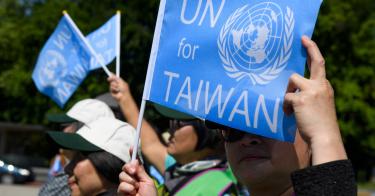For all the hard work and debate, Congress may not present an omnibus China bill to the President this year. That’s okay. Sometimes the quickest results are not the best. We can get back to it next year—or wait until the next Congress. The China challenge is not going anywhere. And lawmakers need time to work their will in the most effective, responsible way possible.
Still, it is worth recognizing the good ideas that came out of this year’s legislative process. The administration would do well to heed them, even short of them becoming law.
Take the House Foreign Affairs Committee’s EAGLE Act, for example. There are big problems with that bill—not least its price tag—but among the useful things it does is incorporate two measures on Taiwan’s international space. One was introduced by Asia Subcommittee Chairman Ami Bera (D-Calif.) and Ranking Member Steve Chabot (R-Ohio), the other by Co-Chairman of the House Taiwan Caucus Gerry Connolly (D-Va.) and Rep John Curtis (R-Utah), a second-term Congressman who has quickly developed into a leader on U.S.-Taiwan policy.
Both provisions bring attention to the infamous U.N. Resolution 2758 that Beijing abuses to control Taiwan’s relationship with the international community.
>>> Why Taiwan Matters to the World
The Bera/Chabot proposal puts the issue succinctly:
United Nations (U.N.) General Assembly Resolution 2758 does not address the issue of representation of Taiwan and its people at the United Nations, nor does it give the PRC the right to represent the people of Taiwan.
Resolution 2758 was passed by the U.N. 50 years ago to admit the People’s Republic of China to the United Nations. It explicitly recognizes the PRC as the only legitimate representative of China on the Security Council, in the General Assembly, and across the U.N. system. There is no reference, however, to sovereignty over Taiwan itself—which remains disputed.
The House Foreign Affairs Committee agrees. The U.N. in 1971 did not determine once and for all determine every aspect of the Republic of China’s relationship with the U.N. The resolution (which the U.S. voted against by the way) certainly has no relevance to Taiwan’s involvement in other international organizations, like Interpol, that are outside the U.N. system, or other aspects of its international engagement. Neither does it give Beijing a right to dictate access of Taiwanese citizens, journalists and others, to U.N. facilities.
Notwithstanding, Beijing has put the U.N. resolution at the center of its effort to block Taiwan’s constructive involvement in the international system.
Look, even with all that’s going on with China now—its wolf warrior diplomacy, its armed harassment of Taiwan—it’s a hard slog getting support for expanding Taiwan’s international space. For goodness sake, if the U.S. and other friends of Taiwan cannot convince member states to allow Taiwan’s meaningful participation in the World Health Organization during the worst global health crisis in more than a century, what can they do? The positions of national governments and the U.N. are baked in, if for no other reason than bureaucratic inertia.
It’s going to take time to undo the damage the Chinese have done to the original intent of the U.N. Taiwan supporters need to take a step back. The U.S. should make clear its own position on the U.N. resolution, what it does, and what it does not do. Preferably, the U.S. would make these statements in concert with its allies, like Japan and Australia (which also voted against the 1971 resolution). Barring an initial meeting of the minds, however, it should move ahead itself, establish a leadership position, and appeal to the conscience and interest of other capitals to join it.
There is an enormous amount to be done besides, as anyone close to the effort to help Taiwan gain participation in international organizations can attest. In the case of Congress, for decades before the arrival of Secretary of State Mike Pompeo, it had to deal not only with obstruction from China and the U.N., but from the State Department.
>>> Vaccinating Taiwan Against Beijing’s Threats
Kicking the legal legs out from under China’s case would build a stronger foundation for progress. Kudos to Congressmen Bera, Chabot, Connolly, Curtis, their many co-sponsors and the House Foreign Affairs Committee for grasping this. They can lead the administration to the same place—whether or not their provisions actually become law.
On foreign policy, too often Congress thinks if it’s not spending more money, it’s not doing anything. No question, the power of the purse its strongest constitutional authority. But it has other, subtler foreign policy instruments. It can use the legislative process to create consensus and keep the executive branch true to its commitments. Look no farther than the Taiwan Relations Act for evidence of just how effective this can be. More recently passed Taiwan-related legislation and what it has done on Hong Kong over the last couple years are also examples.
Whether or not Congress passes an omnibus China bill in the weeks to come is an open question. Either way, it can demonstrate the leadership necessary to keep Taiwan safe and protect American interests.
This piece originally appeared in the Taipei Times



